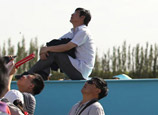
When Chi Cheng was stung by a bee last year, he was surprised to experience relief from his spinal arthritis, rather than the usual pain and swelling. Chi, a 40-year-old traditional Chinese medicine doctor, had battled rickets for around a decade before his bee sting.
Now a convert of apitherapy, the medical use of bee products including venom, Chi doesn't hesitate to unleash his bees on patients suffering a wide range of ailments.
"I am a doctor but also a patient," he said, walking to a room near his clinic where beehives are stored. Moments after placing a small box near the hive's entry, it buzzes with dozens of bees.
Chi carefully carries the box of bees into his clinic in Changchun, Jilin Province. Picking up a bee with tweezers, he plucks its stinger and thrusts it into a knee of his grimacing patient. But Chi doesn't stop there. Over the next few minutes, he plucks dozens more stingers and methodically inserts them around both knees of his patient.
However, not everyone is brave enough for bee sting therapy. Some people fear bees, while others risk suffering potentially fatal allergic reactions.
Although Chi stumbled across the benefits of bee venom by accident, the insects' stingers have been used to cure rheumatism since ancient times in Egypt, India, Rome and China.
















 Teacher detained for molesting school girls | Special coverage: Zero tolerance to child molestation
Teacher detained for molesting school girls | Special coverage: Zero tolerance to child molestation


![]()
